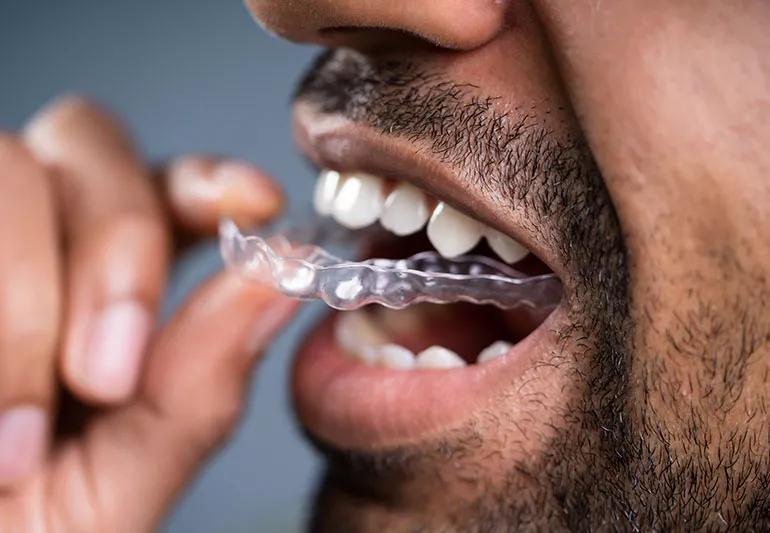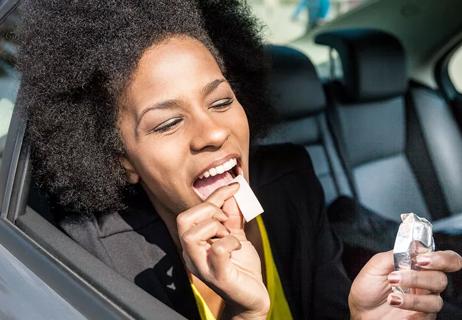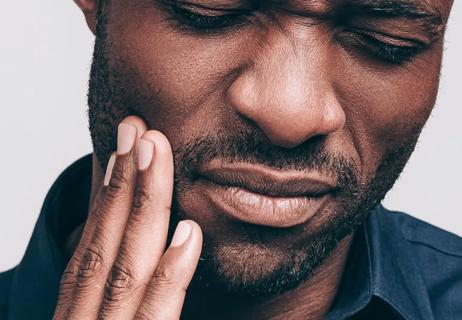An expert gives us the details

If you wake up with a sore jaw or tired, achy jaw muscles, you might be clenching and grinding your teeth at night. This common behavior, known as bruxism, can damage the teeth as well as the temporomandibular joint (TMJ), which connects your lower jaw to your skull.
Advertisement
Cleveland Clinic is a non-profit academic medical center. Advertising on our site helps support our mission. We do not endorse non-Cleveland Clinic products or services. Policy
But there’s a fix. Dental mouthguards — also known as splints, oral appliances or night guards — can protect your teeth, joints and help ease the pain. How can you find the right option for you? Dentist Karyn Kahn, DDS explains what to look for in a mouthguard.
The cause of bruxism might be stress and anxiety, antidepressant use, smoking or alcohol use. But, sometimes, it happens just because. “Clenching and grinding behavior stems from the central nervous system,” says Dr. Kahn. “It’s not something we can control.”
In other words, you can’t just talk or train yourself out of clenching and grinding while you slumber. However, that doesn’t mean you have to live with headaches, damaged teeth and a sore jaw.
Wearing a dental mouthguard for sleeping — not to be confused with athletic mouthguards like those worn by football players — can protect your teeth and soothe your jaw pain.
Guards for teeth grinding come in two varieties:
These dental guards are available in pharmacies and sporting goods stores. Some are sold in sizes like small, medium and large to fit different size mouths.
But many are “boil-and-bite” style: After warming them in hot water, you bite into the softened material to mold the mouthguard to the size and shape of your mouth. That can provide a better fit than the one-size-fits-most variety.
Advertisement
Dentists create customized dental guards to fit the shape of your teeth and jaw. These are pricier than over-the-counter versions, but they fit better and are often more comfortable. (And some dental insurance plans help pay for them.)
At first glance, boil-and-bite night guards and custom-made night guards might not seem so different. But there’s more to the dental appliances than meets the eye. “It’s important to get the bite correct. Patients get a lot more relief from jaw pain with a custom nightguard,” Dr. Kahn says.
“Over-the-counter mouthguards have limited usage. They simply protect the teeth from damage caused by grinding,” she adds.
Custom mouthguards, on the other hand, can be adjusted to create a good bite — to help your teeth come together more comfortably and naturally.
“If the mouthguard doesn’t provide a comfortable bite, then the muscles won’t respond well, resulting in even more pain,” she explains. “With custom mouthguards, we can establish a comfortable relationship between your bite, your TMJ and the muscles that move your jaw.”
Dental mouthguards usually fit over the upper teeth, though some custom models are worn on the lower teeth instead. They come in different materials, too. Over-the-counter mouthguards are usually made from a soft material. Custom models tend to be made from hard resin, Dr. Kahn says. “Dentists can adjust the resin appliances for comfort, stability and bite. And because they’re stronger, they’re more durable.”
Most people with bruxism wear dental mouthguards only at night. But some people who have more serious TMJ disorders might need to wear them during the day as well.
But these oral night guards aren’t just for bruxism and TMJ disorders. Some custom versions can even treat sleep apnea.
Sleep apnea is a serious disorder that causes interruptions in your breathing while you sleep. The best treatment is with continuous positive airway pressure (CPAP), a device that blows air into the airway during sleep. But not everyone can deal with wearing a CPAP device all night.
For people with mild or moderate sleep apnea, an oral appliance can offer a more workable solution. Dentists also custom-make these devices. “But its purpose is entirely different than a night guard for bruxism,” Dr. Kahn says.
Oral appliances for apnea hold the lower jaw forward to keep the airway open. A dentist or sleep specialist should adjust and monitor the device to make sure it’s effective, she adds.
If you wear a dental guard, clean it the same way you clean your teeth. “I recommend brushing it with toothpaste or antibacterial soap inside and out, immediately after you remove it,” Dr. Kahn says. If you wait to clean it at night, tartar can build up on the mouthguard the same way it builds up on teeth.
Advertisement
When you visit your dentist for a check-up, take your dental guard for a check-up of its own. “The dentist can clean it in an ultrasonic machine and also check the bite and look for signs of wear,” she says.
Not sure if a dental mouthguard is the right choice for your jaw pain? Ask your dentist. For many people who deal with clenching, grinding and TMJ disorders, nightguards spell sweet relief.
Advertisement
Learn more about our editorial process.
Advertisement

The soreness could be from the way you sleep, teeth grinding, bite misalignment or other issues

You might think it’s fine, but your teeth and jaw beg to differ

If you have discomfort and pain in your face, it could mean something serious is going on

Take a hands-on approach to release tension and reduce pain in your jaw muscles

TMJ pain can cause headaches, but chiropractic treatments, lifestyle adjustments and medication can help ease discomfort

Although Botox isn’t an FDA-approved treatment for TMD pain, it’s still considered a good supplemental therapy in some cases

You should take it easy, focus on managing your pain and take care of your incision

Wearing a scarf, adjusting your outdoor activities and following your asthma treatment plan can help limit breathing problems

Your diet in the weeks, days and hours ahead of your race can power you to the finish line

When someone guilt trips you, they’re using emotionally manipulative behavior to try to get you to act a certain way